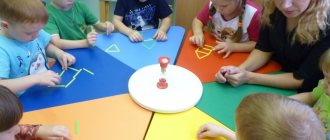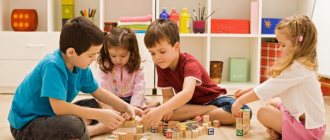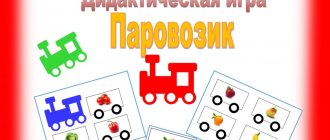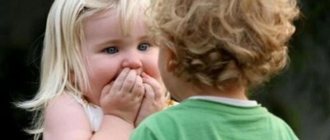The essence of social and personal development of a preschooler
Definition 1
Social and personal development is the formation of a child’s correct attitude towards himself and the environment, as well as his social motives and needs.
In accordance with the Federal State Educational Standard for Additional Education, social and personal development is included in the educational area “Social and communicative development” and is aimed at:
- children’s assimilation of values and norms accepted in modern society;
- formation and development of communication skills through active interaction of the child with peers and adults;
- formation of skills of independence, self-education, self-regulation and direction of one’s actions;
- development of emotional and social intelligence, empathy and emotional responsiveness (empathy);
- formation of readiness to carry out joint activities with peers;
- formation of respect for the surrounding people, the Motherland, history and traditions of the people;
- developing pride and a sense of belonging to one’s family, nationality and community;
- formation of a positive attitude towards various types of labor and creative activities;
- formation of the foundations for safe behavior in everyday life, society and nature.
Are you an expert in this subject area? We invite you to become the author of the Directory Working Conditions
Within the preschool educational institution, the social and personal development of preschool children is carried out in the following forms:
- educational activities;
- joint activities of the teacher and children;
- joint activities of pupils;
- individual types of work of a teacher with children.
Currently, modern kindergartens pay great attention to solving the problem of social and personal development of preschool children. This is due to the fact that it is aimed at shaping the child’s attitude towards the world around him and himself, contributes to the development of social needs and motives, and the formation of self-knowledge. Social and personal development requires a considerable amount of labor from the teacher and the manifestation of pedagogical professionalism, which contributes to obtaining a visible result.
The topic of socialization and adaptation of children in society, the topic of social relationships, is currently relevant. Since many negative phenomena in society observed recently (cruelty, increased aggressiveness, alienation), have their origins in early and preschool childhood. The increased demand for various trainings among adults related to the development of communication skills, interpersonal relationships, the development of stress tolerance skills, and the ability to resolve conflict situations indicates that people now need psychological support and assistance. The ability to build relationships and communication skills with other people arise and intensively develop in childhood. The experience of first relationships in the family and in kindergarten is the basis for the further development of the child’s personality and largely influences the characteristics of a person’s self-awareness, his attitude to the world, his behavior and well-being among people throughout his life.
Preschool childhood is the most important first six to seven years, when the development of children proceeds rapidly and intensively, when the foundation is laid, the foundation for further growth and personal development. Coming to kindergarten, a child finds himself in new social conditions, his usual way of life changes, and new relationships arise with new people. A change in environment may be accompanied by an increase in anxiety, a reluctance to communicate with others, and a decrease in activity. The subsequent path of a person’s social and personal development depends on how the child’s socialization and adaptation proceeds in children’s society.
The social and personal development of a preschooler, that is, the formation of the child’s attitude towards himself and the environment, his development of social motives and needs, the formation of his self-knowledge, is a rather complex process, requires considerable labor from the teacher and, in terms of effectiveness, is usually delayed in time. Socialization occurs in the child’s interaction with the world around him and the transformation of his individuality thanks to this interaction. We, teachers, are faced with a very difficult task, working with a group of children, to find such effective methods and techniques of work that will give the highest results in the social and personal development of children. A feature of socialization in preschool age is a significant complication and expansion of the scope of socializing influences, not only in interaction with adults, but also through play contacts with peers. Communication, increasingly acquiring the features of communicative activity, takes shape as a powerful social factor in the development of a child’s personality.
Play is of great importance for the acquisition of ethical standards in preschool age. Play is the most accessible type of activity for children; it is a way of processing impressions and knowledge received from the surrounding world. In the educational process of preschool educational institutions, the principle of the importance of all types of activities and the rational combination of games and other types of activities is observed. "Let's play! “How often in the bustle of life we do not attach importance to this call, request, and sometimes the voice of an unfulfilled dream, coming from our distant childhood and sounding from the lips of a child. “Let's play, come on! “And what does he hear in response? - your opinion. (guests’ responses) “I don’t have time... I can’t. I’m tired... I’m in a hurry... I don’t have time...,” we say to our child. “Go and play,” we often say to children in kindergarten. And the children go and play: they play Spider-Man, monsters, which they then fear, others play some romance novels from modern TV series... In children's games, rarely does anyone raise children, cook lunches and dinners, do laundry, and clean. More often these are weddings, shopping, business... What we see in our children’s games is a reflection of the world that we give them.
This is how we talk to each other, this is how we put our children to bed, we do these things, we watch these TV shows and movies, we buy these games for our children. In my work I pay a lot of attention to the game. I use games and gaming techniques in various types of activities, in everyday life and in organized educational activities. A special place in the educational process in all age groups is occupied by role-playing games - these are games that the children themselves come up with. They reflect their knowledge, impressions, ideas about the world around them, and recreate social relationships. Each game has a theme, a game plan, a plot, and role content. In these games, children take on the roles of adults, and in specially created playful, imaginary conditions they reproduce the activities of adults and the relationships between them. For a role-playing game to occur, the child must have knowledge about his environment, events and phenomena of social life.
Now I work in the junior group. At a younger age, role-playing games have a simple plot. The child strives to define a role for himself, may become interested in it for a while, but after a while he forgets about it and “switches” to another role and often vaguely changes the plot of the game. Therefore, at this age I take on the main role. The main technique is playing together. In a play situation, I show actions with toys and substitute objects. Knowing well the character of children, I can entice them into joint activities with toys. At this age, one of the important tasks is to develop the simplest skills of playing together. It brings joy to children and provides an opportunity to share knowledge. Most often, I get involved in the game process myself and show examples of game action, talk about the rules of the game, and introduce an element (attribute). I work to develop children’s communication through play. I encourage children to have friendly relations during play, teach them to negotiate, show empathy, respect their play partners, and resolve controversial issues and situations. In the process of organizing different types of games, I take into account the desires of children, their individual characteristics and emotional state, as well as friendships. An individual approach to organizing play activities is important in the personal development of a child. Understanding this, I organize games taking into account the personal characteristics of children: shy, hyperactive, conflict-ridden. I organize games for boys and girls, as well as joint ones. In role-playing games, girls play the roles of mothers and housewives, while boys play roles associated with masculine professions. I pay attention to the appropriate behavior of children. To develop gaming activity, it is necessary to create a subject-development environment.
I approach the creation of a subject-developmental environment creatively. I organize the subject-development environment in such a way that every child can do what he loves. The placement of equipment allows children to unite in small subgroups based on common interests. And the entire group space is available to children. The play areas feature large items such as “Kitchen” and “Barbershop”, as well as many different sized modules and waste materials. There are role-playing games, attributes and substitute objects for them, there are didactic games, card indexes of outdoor games, there are different types of theaters, a mumming corner. The full development of gaming activities becomes possible only with bilateral efforts in this direction - the family and the preschool educational institution. To do this, I organize constant work with parents, including both education and training in the skills of managing the play activities of children in the family based on certain principles: Recommendations for parents to play with their children themselves; buy toys of different types; enrich children's experiences; collect materials that replace toys with your children; think about the usefulness of the toy.
Result: if the child plays enthusiastically and for a long time, parents can be calm: the baby is developing correctly! Consultations “Toys for your children”, “Play with children”. “Development of a child’s speech during play.” Parent meetings on the topic: “Growing up by playing,” “Play is a serious matter.” I hold “Open Days” where the parents of my group can see how their children play and communicate with peers and adults. Playful activities make the child feel like an equal member of human society. In the game, the child gains confidence in his own abilities, in the ability to get real results. In conclusion, I would like to draw the following conclusions: The game should be free from themes and regulation of actions imposed by adults “from above” The child should have the opportunity to master the increasingly complex language of the game - the general ways of its implementation The game should be a joint activity of the teacher and children Tips: practice is important for the game , play with children as often as possible, welcome the manifestation of any feelings, but not any behavior, support children’s efforts to maintain good relationships with peers pay special attention to children who do not play; children are grateful not so much to the adult leader as to the adult inventor; the game should be interesting for both adults and children Educators should enjoy the noisy activity of children.
Tasks of social and personal development of preschool children
The main tasks of social and personal development of preschool children:
- Formation in children of a complete picture of the social world, themselves and their place in society.
- Nurturing an active life position and adequate social feelings.
- Forming an idea about the people around you, yourself, nature, man-made works, etc.
Finished works on a similar topic
Course work Social and personal development of preschool children 430 ₽ Abstract Social and personal development of preschool children 220 ₽ Test work Social and personal development of preschool children 210 ₽
Receive completed work or specialist advice on your educational project Find out the cost
The process of social and personal development continues in a person throughout his life. However, its foundation is laid in preschool childhood. It is during this age period that the first components of social behavior are formed in the child, and emotional, personal and behavioral lines appear. Children are always active and strive to perform various types of activities; the task of the educator (parent) is not to slow them down in this endeavor, but, on the contrary, to motivate them for constant development and improvement, not to let the desire to develop and learn fade away. A large role in this direction is played by various types of games that the child plays not only with peers, but also with adults and even with himself.
It is a mistaken opinion that a child should constantly be doing something useful, and not just playing. However, it is the game that is the leading activity of the child. In play, a child learns about the world, develops, and develops the necessary skills and abilities. During games, children's development moves at a rapid pace: mental, social, emotional. Every teacher, organizing the social and personal development of preschool children, must make maximum use of the opportunities of play for the social development of children.




